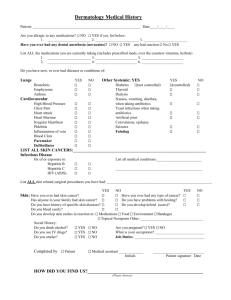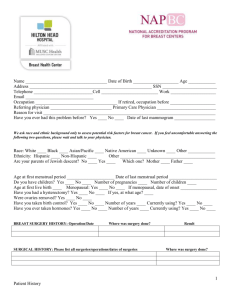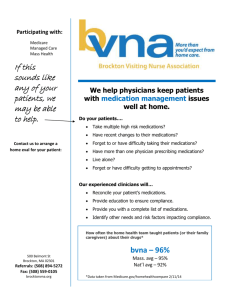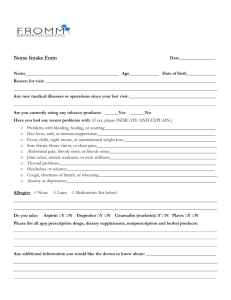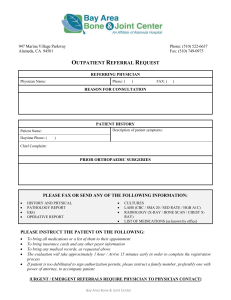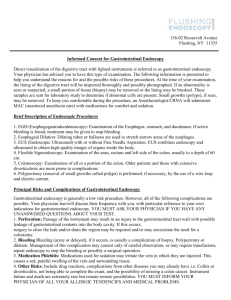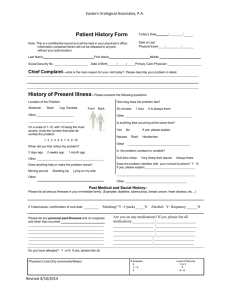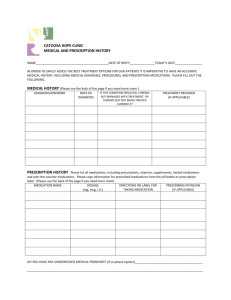ERCP Instructions
advertisement
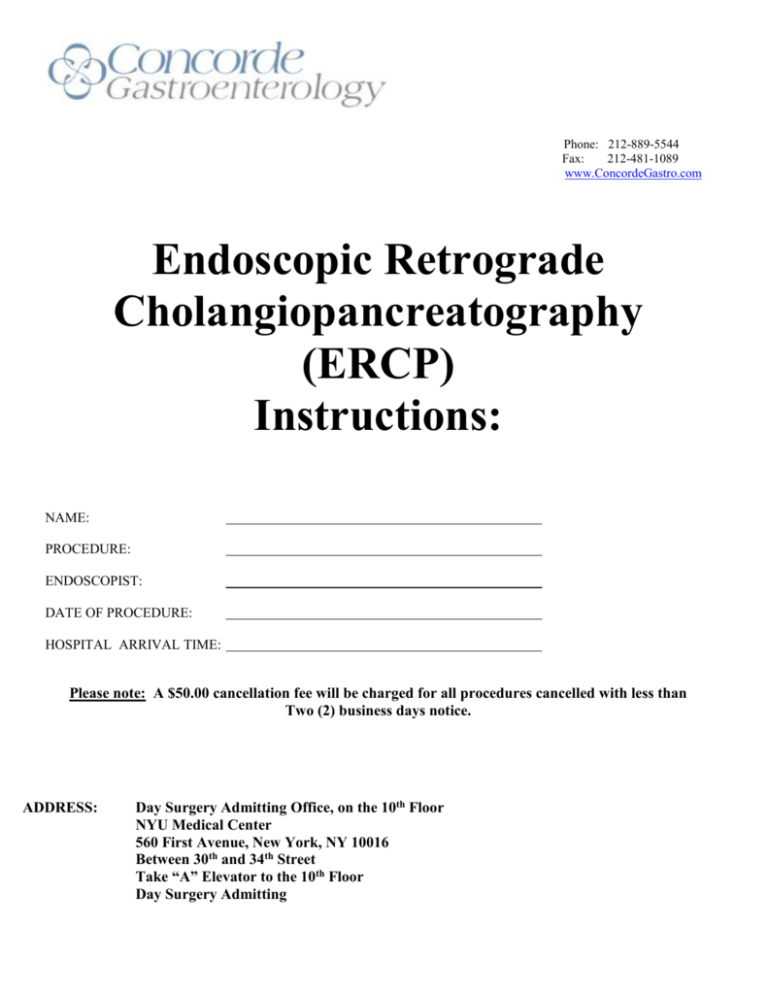
Phone: 212-889-5544 Fax: 212-481-1089 www.ConcordeGastro.com Endoscopic Retrograde Cholangiopancreatography (ERCP) Instructions: NAME: PROCEDURE: ENDOSCOPIST: DATE OF PROCEDURE: HOSPITAL ARRIVAL TIME: Please note: A $50.00 cancellation fee will be charged for all procedures cancelled with less than Two (2) business days notice. ADDRESS: Day Surgery Admitting Office, on the 10th Floor NYU Medical Center 560 First Avenue, New York, NY 10016 Between 30th and 34th Street Take “A” Elevator to the 10th Floor Day Surgery Admitting Phone: 212-889-5544 Fax: 212-481-1089 www.ConcordeGastro.com PROCEDURE INFORMATION SHEET ERCP is a specialized technique used to study the ducts (drainage routes) of the liver, gallbladder and pancreas. An endoscopic (flexible then tube that allows the physician to see int the bowel) is passed through the mouth, esophagus, and stomach into the duodenum (first part of the small intestine). After the common opening to ducts from the liver and pancreas is visually identified, a catheter (narrow plastic tube) is passed through the endoscope into the ducts ( pancreatic or biliary) and x-rays are taken. *** Risks of the sedative medications include, but are not limited to, allergic reactions and respiratory depression. In addition to the risks described above about this procedure there are risks that may occur with any surgical or medical procedure. There can be no guarantees regarding the results of this procedure. Although endoscopic procedures are sensitive for the presence of gastrointestinal abnormalities, there is a risk that significant abnormalities of the gastrointestinal tract may not be detected by this procedure; this is especially true if the preparation of the gastrointestinal tract is not ideal. Further information about these procedures can be obtained at the following organization websites: The American College of Gastroenterology: www.acg.gi.org/patients/ The American Society for Gastrointestinal Endoscopy: www.askasge.org/ Phone: 212-889-5544 Fax: 212-481-1089 www.ConcordeGastro.com Frequently Asked Questions (FAQ’s) The following list of questions and answers may assist you in preparing for your procedure: Q) A) I am having an upper endoscopy. Do I have to do anything to prepare for this procedure? There is no specific preparation but you should not eat or drink anything after midnight the night before the test. Q) My procedure is scheduled for the afternoon. Can I eat or drink anything the morning of the procedure? You should not eat anything after midnight. You may have up to 1 cup of clear liquid four hours prior to your scheduled arrival time at NYU Hospital. A) Q) Will my procedure be painful? A) No. NYU Hospital is fully staffed with Board-certified anesthesiologists to ensure that your procedure is comfortable. Q) Do I have to bring an escort with me? A) Yes. The NYU Hospital requires that you have an escort to take you home. If you do not have a friend or companion to bring with you please contact Lisa Savanik, an NYU social worker, @ 212-263-5018 to make other arrangements. (There is a $75.00 charge for a social worker care partner.) NOTE: You will not be able to have this procedure without a Care Partner accompanying you. Q) My doctor has all my insurance information. Do I need to bring my insurance card and billing information? A) Yes. Q) A) Do I take my heart medications on the day of my procedure? In general, you can continue to take prescribed medications before and after gastrointestinal endoscopy without modification. Essential medications may be taken on the day of your procedure with a small amount of clear liquid. There are some types of cardiovascular medications, however, that should not be taken on the day of your procedure; these include diuretics, ACE inhibitors, and angiotensin II receptor blockers. If you are unsure if the medications you take fall into these categories, please ask your physician or consult the following website: www.webmd.com/drugs. Q) A) I am a diabetic. Should I take my medication on the day of my procedure? In general, diabetic medication should not be taken on the day of your procedure. There are, however, important medical circumstances in which these medications must not be stopped. If you have any questions about stopping these medications, consult your primary physician. When the procedure is over and you have resumed a normal diet, your usual diabetic regimen should be resumed. Phone: 212-889-5544 Fax: 212-481-1089 www.ConcordeGastro.com FAQ’s (continued): Special Medical Considerations Q) A) Q) A) I have been told to take prophylactic antibiotics prior to dental work. Do I need to take antibiotics before my endoscopic procedure? With rare exceptions, the procedures performed at NY Hospital do not require the administration of prophylactic antibiotics. If, however, you are advised by your physician to take antibiotics prior to gastrointestinal endoscopy, you may take them orally, 1 hour prior to the procedure, with a small amount of clear fluid. If you require antibiotics and have not taken them prior to the procedure, please inform the NYU Hospital staff and the antibiotics will be given intravenously. I take aspirin, or anticoagulants or other blood thinners. Do I need to stop these medications before my procedure? In general, aspirin, anticoagulants and other blood thinners should be stopped at least 3 days prior to your procedure. This is to reduce the chance of bleeding if biopsies are obtained or polyps are removed. There are, however, important medical circumstances in which these medications must not be stopped. If you have any questions about stopping these medications, consult your primary physician. Q) A) What if I am pregnant or may be pregnant – should I undergo gastrointestinal endoscopy? If you are pregnant, you should consult with your physician about whether you should undergo gastrointestinal endoscopy. Q) A) I am breast feeding my baby. Is the procedure safe for my baby? In general, women who are breast feeding may safely undergo gastrointestinal endoscopy – the administered anesthetic is not excreted in significant quantities in breast milk. Some mothers elect to store milk via a breast pump and feed the child with the pumped milk on the day of the procedure. Normal breast feeding may resume the following day. NYU Hospital Center Patient Access Department 560 First Avenue, SK-109, New York, NY 10016-6497 Dear Patient, We are pleased you have chosen to come to NYU Hospital Center for your medical care. Certainly, you have many concerns on your mind right now. Please let us address some issues that we know may affect you. It is the policy of NYU Hospital Center, as it is now for most every hospital, to require that you pay your portion for our services at the time we schedule or register you for this admission. We can tell you before or at the time of admission, based on your insurance, what that co-payment might be. Please be prepared to pay before or at the time of admission 100 % of any payment not covered by your insurance (co-payment, deductibles, or self-payment if not insured for the services.) You may pay with cash, checks, or credit cards. Call us at 212-263-5005 to discuss any questions you may have, or any payment arrangements you will need to make. Please understand that we must ask to be paid at the time you agree to our services, just as any other professional, merchant, or service provider does. Our hospital could not carry on and care for all those who need us if we don’t collect for the cost of care we give you. If you are coming for inpatient surgery, please call 212-263-5005 the evening before your scheduled admission, and we can tell you when to come and answer any questions about payment and the admission process. Please bring all your health insurance cards and information with you. If a spouse, a parent, or other family member’s insurance might cover you, please bring those cards as well. Your insurance company may need to authorize your care by giving you ‘pre-certification’ before you are admitted. Please call your insurance company to tell them about your planned admission, and find out if you must get their approval first. This is your responsibility. If you don’t, you may be responsible to pay more money. A parent or legal guardian should accompany patients under the age of 18. Please do not bring any valuables with you to the hospital. Leave all rings, watches, jewelry, or other valuables at home. If you request a private room, please understand that there is an extra charge for every day you spend in a private room. This charge is not covered by your insurance. We ask for a deposit for the first three nights planned in a Tisch Hospital private room, or for the first two weeks planned in the Rusk Institute for Rehabilitation Medicine. We are available to help, and want to ensure that you are prepared for your stay. If you have any questions, please ask Sincerely, Steven Weiner, FNP Senior Director, Patient Access
